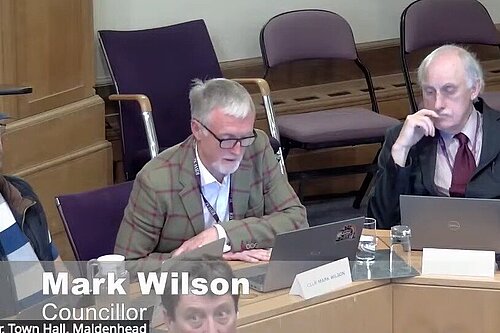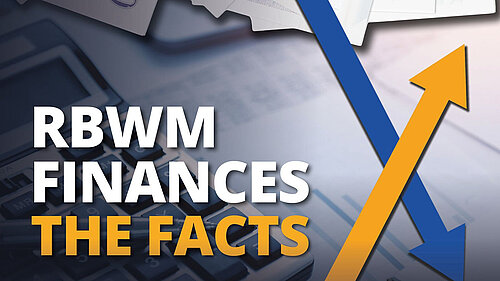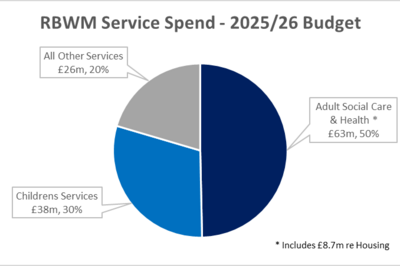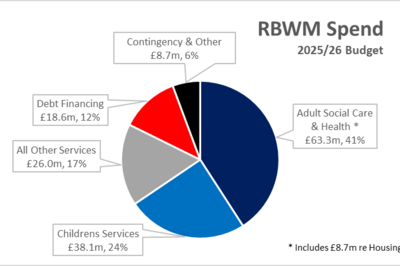
RBWM Lib Dems Propose Report into Historic Council Financial Failings
Cllr Mark Wilson amends irresponsible Tory motion and seeks a full report summarising independent reviews of historic failures of financial governance and management.

The draft 2025/26 RBWM budget was published and approved for consultation on 19th December 2024. Link here to the RBWM press release and draft budget.
The dire state of the Borough’s finances has been well documented and described over the past year or more. This has reached a critical point now with the preparation of the 2025/26 budget. Like every other local authority, RBWM has a legal duty to set a balanced budget. The hard fact is that RBWM is unable to set a balanced budget for next year, or become sustainable in the medium term, without significant government support.
Five main factors have created the situation we are facing today:
Historic cuts to RBWM council tax rates – from 2010, successive Conservative administrations cut council tax for six years and froze for a further year, leaving the budget £30m lower now than if national average increases had been applied.
Increased debt – debt increased from £59m in 2014 to around £230m now, which is expected to cost £18.5m to service next year. The vast majority of this debt increase was incurred by the Conservative administration of 2015-2019. We do not have an asset portfolio (and therefore an income stream) to match this debt due to poor operational decisions and accounting practices in the past.
Historic accounting errors – a detailed review of financial accounts – the first since 2021 – revealed errors booked under the Conservatives’ watch currently totalling £30m which need to be corrected.
High and increasing demand for care services – being adult and children’s social care (statutory care for the most vulnerable in our communities) and temporary accommodation, also for vulnerable people. Private social care providers, facilitated by Conservative party policies, are increasing charges uncapped and with demand for services exceeding supply, the council is paying for private profits in an unsustainable way.
RBWM officers and councillors have spent the last 18 months working to gain clarity on the financial situation. This has been hampered by a lack of robust processes, efficiency and data flows due to a lack of investment in council systems and processes over many years. This administration has made a number of improvements to create a strong foundation and demonstrate to government that we are doing everything we possibly can to shore up the council. These include:
Initial financial recovery plan agreed by Cabinet and Full Council in Sept 2023
Spending Control Panel set up in October 2023, to scrutinise all spend items over £500
Detailed and specific transformation programme, FutureShape RBWM, established in April 2024, and regularly reported on since.
CIPFA review of the council’s financial resilience which endorsed the administration’s plan.
Reductions to the capital programme to focus only on the most important priorities
Approval of the RBWM Financial Improvement and Sustainability Plan (FISP, link here) by Cabinet and Full Council in November 2024.
Programme of asset disposal in conjunction with a review of the Property Company, to better manage property assets in the Borough.
Progressing major development sites such as the Elizabeth Quarter (including the Maidenhead Golf Course) and Nicholson’s Quarter, delivering over 2,000 homes and over £100m of capital receipts in the future.
Stronger governance, more transparency and a higher quality of financial and operational reporting
These actions not only benefit the council but also demonstrate to government that we have a plan and are taking the necessary steps to put the council on a sustainable footing. This is a critical part of securing the financial support we need and avoiding the issuing of a Section 114 notice, effective bankruptcy.
The administration has taken the tough decision to formally request, from government, a loan (known as Exceptional Financial Support) and approval to raise council tax above the normal limit. The proposal needed for the council to be sustainable next year and in the medium term is a loan of £60.3m and a council tax increase of an additional 20% over the guide 4.99% increase.
We have put forward a one-year solution (i.e. asking for the council tax rise we need in 2025/26) to be consistent with the Government’s approach (a one-year settlement for 2025/26 followed by a longer term settlement from 2026/27). This minimised costs from borrowing, however other options such as spreading an above-cap increase over two years, could be considered as part of discussions with MHCLG, the Ministry for Housing, Communities and Local Government. We await the result of our request, which we expect to be finalised in mid-February 2025.
Despite this significant increase in council tax, RBWM households will still pay considerably less council tax than their equivalents in surrounding local authorities and the whole of Berkshire, including being more than £450 a year lower than Reading (at Band D). We have also proposed an increased support package for the most vulnerable residents in the borough, protecting them from the impact of the additional increase in 2025/26.
The present situation is much clearer than it has been for many years, and both our assessment and the plan have been validated by CIPFA, the external, independent professional body of Public Finance and Accountancy, who’s support is also critical for gaining government support.
From a detailed review that CIPFA carried out in 2024, included in Cabinet Papers here, CIPFA independently verifies our assessment:
“Given the state of the finances in the Royal Borough of Windsor and Maidenhead (RBWM) that was inherited by the new Administration, CEO and CFO in the summer of 2023, a s114 notice could be required in 2024-25 if the council cannot take immediate action to mitigate the overspends.
“The previous CIPFA review in 2020 highlighted the risks of a section 114 notice. As with many authorities, there are increasing financial pressures due to increased demand and costs in adult social care, children’s social care, special education needs and temporary accommodation.
“RBWM’s ability to absorb such pressures has been undermined by the need to backfill a pensions deficit and decisions dating back to 2010 to cut council tax significantly year on year for a period of six years – and then freeze if for a further two years - which has left the council’s baseline around £30m lower than if council tax increases had kept pace with average rises across the country
“Furthermore, RBWM’s debt position has grown significantly over a similar period, from £58.7m in 2013 to £204m a decade later. This means the council will be paying around £14m in 2024-25 in debt servicing and MRP costs – over 10% of the revenue budget.”
CIPFA again is in agreement with the RBWM and Administration assessment regarding next steps:
The longer-term financial sustainability of RBWM is dependent on remedying the funding gap generated by the council tax reductions and reducing its debt burden.
RBWM needs a robust, credible strategy to secure short-term and longer-term financial sustainability that shows the council is prepared to act boldly and make “politically unattractive” decisions.
The report details a number of steps we are now taking regarding transformation and recovery plans, and also specifically states the plans should include:
Establishing a suitable council tax increase that will enable RBWM to build reserves in the future
Due to the very low level of Council tax currently, a 25% increase will still leave RBWM as the lowest of all Berkshire and neighbouring authorities, and still one of the lowest outside of London.
Support will be put in place for those currently in receipt of council tax support, insulating them from the increase this year. Further discretionary support is available for those in severe need but not otherwise qualifying for support.
Our preferred course of action is to retain control and fix the mess. However, there are two other possible options:
Declare a Section 114 (effective bankruptcy) – this will hand over control to national commissioners, who will not understand local issues and residents’ priorities as well as elected members – this is not a good option. In this situation, the Council’s existing debt of £230m would not be written off and there would be an additional cost for the commissioners.
Merge with neighbours – not short term and will lead to higher increase in CT and a less local approach – the Conservative MP’s suggestion to merge with Slough will drive a council tax increase of 40% and add Slough’s debt to our problems, this is highly undesirable.
RBWM is already a very lean organisation – in some departments, too lean – and most services are being delivered very efficiently.
To provide some context, looking at all the services that RBWM provides, shown in the chart below, Adults, Children and Housing comprise 80% of the total cost of services – all other services (waste, highways, parks, planning, IT, legal etc etc) are covered by 20% of the spend.

The scope for extracting further savings in the other service areas is limited, although we are working with external experts, Newton to identify further effiencies in statutory services. Turning to the 80%, we are at the mercy of private providers for much of these services – private care homes for both adults and children, and private landlords for rented temporary accommodation have the advantage in negotiations due to demand exceeding supply. Further, demand (the number of people needing to access these services) has increased beyond our budgeted levels this year – this is something RBWM cannot control but does have a statutory duty to provide the required care for these most vulnerable of people.
Additionally, this year, we have seen challenges in forecasting in Adults and Children’s social care, and in Housing, but the council has been reliant on outdated systems and processes to manage these areas. New systems are being implemented as part of the FutureShape Transformation programme which will drive better decision making and more accurate forecasting.
On top of these service costs, we will have to pay nearly £19m in debt servicing costs, due to the £230m of debt incurred previously, much of which was spent on items that do not give a return.
The chart below shows the overall categories of spend, including debt financing and contingency/other.

Looking at service spend per head of population, RBWM compares very favourably to our near neighbours when looking at the 2024/25 budget.
Considering geographical near neighbours, RBWM is significantly lower than all our geographical neighbours, as below.
Adjusting for the current expected overspend in 2024/5 gives approximately £1,417 per head, still over £100 lower than the next lowest in the area.
Considering CIPFA statistical near neighbours – these are authorities that CIPFA considers as having a similar profile of services and demographics to RBWM - we are the second lowest of 16, as shown in the graph below.
Adjusting for the current expected overspend in 2024/5 gives approximately £1,417 per head, only moving us up one place to third lowest of 16.
These two views show RBWM in a very favourable light in terms of efficiency of spend in delivering all the services required of a Unitary authority.
Public consultation - 19th December 2024 to 30th January 2025
Review by Corporate Overview and Scrutiny panel on 5th February 2025.
We expect to hear the decision of Government around mid-February.
The result will be reflected in the final budget papers, which will be considered by Cabinet on 26th February 2025 and Full Council on 5th March 2025.
You can watch these public meetings in person or live via the RBWM Youtube channel.
Draft Budget Press Release: Draft 2025/26 budget sets out need for significant council tax increase to avoid bankruptcy | Royal Borough of Windsor and Maidenhead
Draft Budget Consultation: Have your say on the borough’s budget proposals for 2025/26 | Royal Borough of Windsor and Maidenhead
CIPFA Report: CIPFA RESILIENCE REVIEW - RBWM.pdf
Recovery Plan Cabinet Press Release: Cabinet to consider recovery plan following independent review of finances | Royal Borough of Windsor and Maidenhead